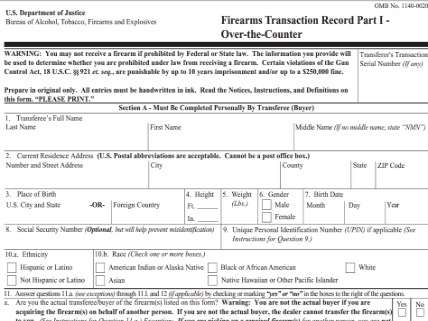For Those Who Say All Gun Buyers Should Be Screened, the Data Don't Matter
Whatever the numbers are, they supposedly support the case for universal background checks.

According to a new survey, about one-fifth of recent gun transfers in the United States occurred without a background check. That is half as big as the fraction commonly claimed by gun control advocates, based on a dubious extrapolation from a 1994 survey.
But it turns out that whatever the actual number is, it reinforces the case for mandating a background check every time someone acquires a gun. Duke University criminologist Philip Cook, who co-authored the 1997 study that was the source of the claim that "as many as 40 percent of all gun purchases…take place without a background check" (as President Obama has repeatedly asserted), says the new, much lower estimate shows that the goal of universal background checks is eminently achievable. "The headline is that we as a nation are closer to having a hundred percent of gun transactions with a background check than we might have thought," Cook told The Trace. "It's more attainable, and cheaper, to pass a universal requirement than it would be if 40 percent of transactions were still being conducted without these screenings."
The new estimate, which comes from a study reported this week in The Annals of Internal Medicine, is based on an online survey of 1,613 gun owners conducted in April 2015. The one-in-five estimate comes from a subsample of 424 respondents who had acquired a gun in the previous two years, 22 percent of whom reported that they did not undergo a background check. That share was lower, just 13 percent, for those who bought guns, and lower still, just 4 percent, for those who bought them in stores, which are required to conduct background checks under federal law. The share of unscreened gun owners was higher, ranging from 45 percent to 77 percent, for those who obtained firearms without paying for them (as gifts, for example) or who bought them from relatives, friends, acquaintances, or sellers who advertised online.
The federal background-check requirement applies only to licensed gun dealers, but it applies to them no matter where the transaction takes place. It does not apply to so-called private sales, which do not involve a licensed dealer, whether they happen at a gun show or elsewhere. That's why demands for closing the "gun show loophole" are misleading. Notably, all of the respondents in this survey who had bought firearms at gun shows in the previous two years underwent background checks.
The researchers found that the share of guns acquired in private sales without a background check was lower in states that require screening for such transactions: 26 percent, compared to 57 percent in the other states. That suggests about a quarter of private sales occur without a background check even when one is legally required, which is not surprising, since private sales are inherently hard to monitor. The persistence of unrecorded private sales, combined with gun theft and straw purchases by people with clean records, means that extending the background check requirement cannot reasonably be expected to prevent criminals from arming themselves.
At the same time, a universal background check requirement would disarm many people who pose no threat to public safety, based on the arbitrary disqualifications established by federal law. Anyone with a felony record, for instance, is forbidden to own a gun, no matter when his offense occurred and regardless of whether it involved violence or even a victim. That fact should give pause to progressives who oppose the disenfranchisement of people with felony convictions and applaud efforts to restore their voting rights. If it is unjust to prevent, say, a nonviolent drug offender from voting, it is at least as unjust to stop him from exercising the basic human right of armed self-defense. It is likewise unfair and unreasonable to decree that someone treated for suicidal impulses forever loses his Second Amendment rights. Requiring background checks for all gun transfers, regardless of how popular the idea may be, will only multiply such injustices.


Show Comments (193)